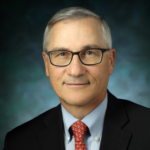Gerald L. Andriole Jr., MD, presented “5-Alpha Reductase Inhibitors Increase the Risk of Aggressive Prostate Cancer: Fact or Myth” during the 44th Annual Ralph E. Hopkins Urology Seminar on February 7, 2025, in Jackson Hole, Wyoming.
This content is available free to the GRU Community. Login or create an account to view it.
How to cite: Andriole, Gerald L. “5-Alpha Reductase Inhibitors Increase the Risk of Aggressive Prostate Cancer: Fact or Myth.” February 7, 2025. Accessed May 2025. https://grandroundsinurology.com/5-alpha-reductase-inhibitors-increase-the-risk-of-aggressive-prostate-cancer-fact-or-myth/
5-Alpha Reductase Inhibitors Increase the Risk of Aggressive Prostate Cancer: Fact or Myth – Summary
Gerald L. Andriole, Jr., MD, challenges misconceptions about five-alpha reductase inhibitors (5-ARIs) in urology, focusing on their role in prostate cancer. In this 14-minute presentation, Dr. Andriole notes that interest in 5-ARIs and cancer prevention originates from BPH trials, where cancer incidence was lower among treated patients.
Dr. Andriole shares details from the Prostate Cancer Prevention Trial, which showed a 20% reduction in cancer detection with finasteride. The REDUCE trial, focused on high-risk patients, confirmed a 23% reduction in cancer with dutasteride without increasing high-grade tumors.
Long-term studies refute concerns about aggressive cancers. Scandinavian and US analyses confirm reduced overall cancer detection and no increased risk of advanced disease. A refined PSA interpretation strategy—detecting a 0.3 ng/mL rise from nadir rather than PSA doubling—improves cancer detection in 5-ARI users. The findings reinforce 5-ARIs’ role in reducing prostate cancer risk without increasing mortality.
About The 44th Annual Ralph E. Hopkins Urology Seminar:
The Ralph E. Hopkins Urology Seminar is a multi-day meeting focused on training urologists in the latest in assessing, diagnosing, and treating urologic conditions in the clinical setting. Updates are provided on urologic cancers, stone disease, urologic reconstruction, female urology, infertility, sexual function, emerging surgical techniques, and general urology. The 44th iteration of the meeting took place from February 5th to February 8th, 2025, in Jackson Hole, Wyoming.
For further educational activities from this conference, visit our collection page.
ABOUT THE AUTHOR
Gerald L. Andriole, Jr., MD, is the global Chief Medical Officer at Prostatype Genomics. He previously was Professor and Director of Urology in the National Capital Region at the Brady Urologic Institute at Johns Hopkins University. He also formerly served as the Robert K. Royce Distinguished Professor and Chief of Urologic Surgery at Barnes-Jewish Hospital, the Siteman Cancer Center, and Washington University School of Medicine in St. Louis, Missouri.
Dr. Andriole received his medical degree from Jefferson Medical College in Philadelphia, Pennsylvania. He trained in surgery at Strong Memorial Hospital and the University of Rochester, and completed his Urology Residency at Brigham and Women’s Hospital and Harvard Medical School. Subsequently, he was a Fellow in Urologic Oncology at the National Cancer Institute in Bethesda, Maryland. Dr. Andriole has over 40 years of consistent contributions in the areas of prostate cancer screening and prevention research as well as BPH. He has contributed to over 450 peer-reviewed publications. He chaired the Prostate Committee of NCI’s PLCO Cancer Screening Trial, the Steering Committee of the international REDUCE International Prostate Cancer Prevention Trial and the Prostate Committee of the SUO Clinical Trials Consortium. He is a member of the American Urological Association, the Academy of Master Surgical Educators of the American College of Surgeons, the American Surgical Association, the American Association of Genitourinary Surgeons, and the Clinical Society of Genitourinary Surgeons, among other societies.
He has received the Outstanding Achievement Award from the Urologic Oncology Branch of NCI, the Distinguished Clinician Award from Washington University, the Alumni Award from Jefferson Medical College, and the Williams Award for Prostate Cancer Research Excellence from the AUA Urology Care Foundation, among others.

